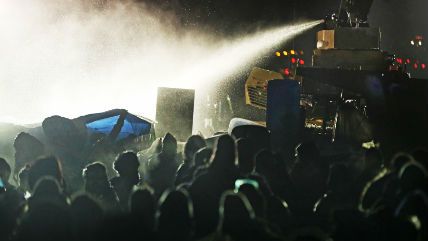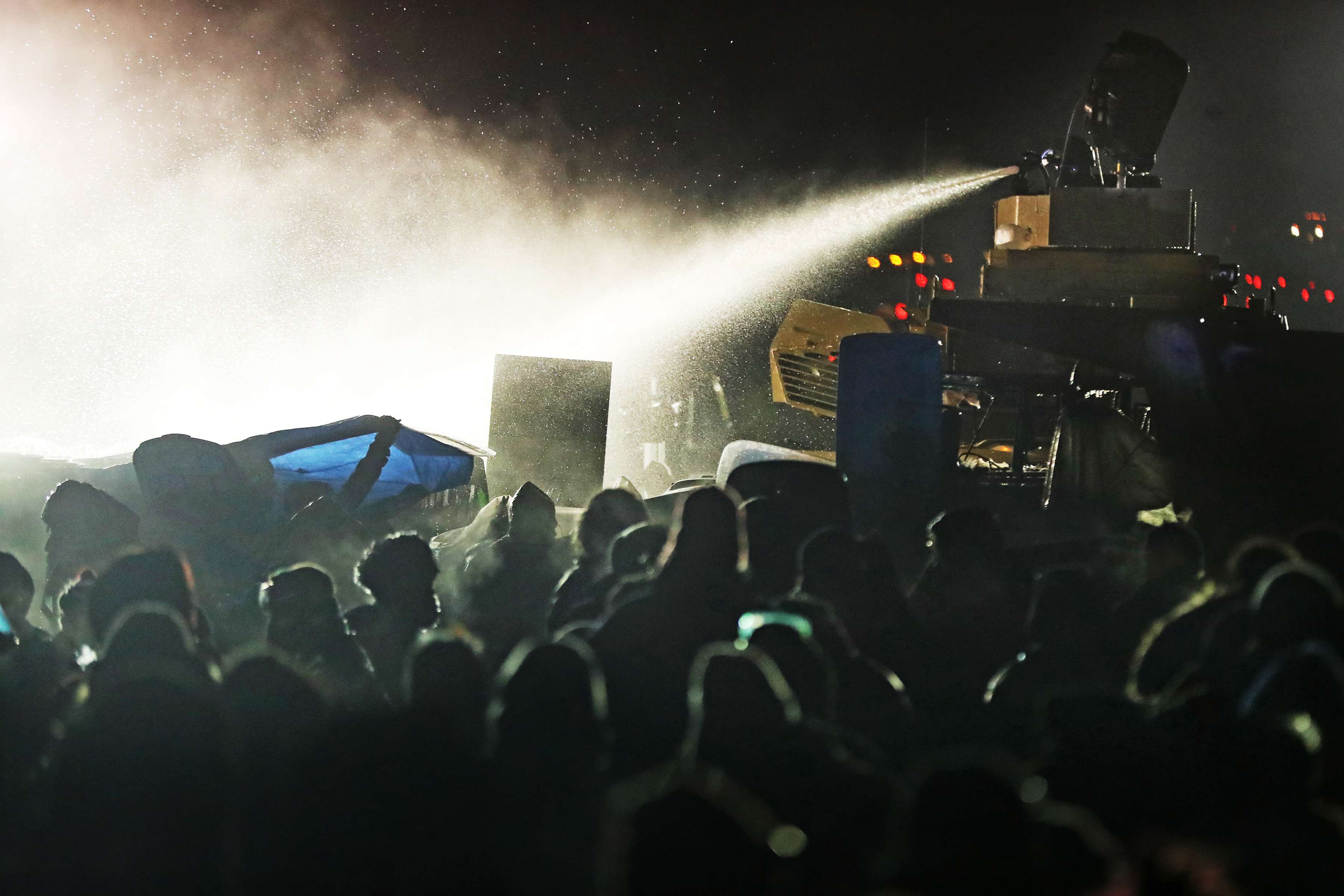Brutal Police Actions, Tactics Reported from Dakota Pipeline Protest
Sophia Wilansky had her arm seriously damaged by what protesters say was police-tossed concussion grenade; police deny using any such weapon. Water has been sprayed on protesters in freezing temperature.

As the protests over the Dakota Access Pipeline stretch into their seventh month, reports of brutal police attacks from the scene continue.

Most of the available video from the protests is shot and transmitted by people on the scene. But in the past week or so police behavior has been garnering major newspaper attention, and most of the information below are from such sources. But a collection of livestreams from Sunday night's violence can be found here.
• 21-year-old protester Sophia Wilansky had her arm seriously injured Sunday by what her family and other protesters insist was a concussion grenade tossed at them by law officers.
Disturbingly graphic photos of the damage to Wilansky's arm can be found here, not for faint of heart.
Her father Wayne Wilansky told The Guardian that:
"The best-case scenario is no pain and 10-20% functionality,"…He said…the arteries, median nerve, muscle and bone in her left arm had been "blown away".
Sophia will require additional surgery in the next few days and her arm may still have to be amputated, he added. "She's devastated. She looks at her arm and she cries," he said.
Law officers denied to the Los Angeles Times that they used tossed any such thing at protesters.The Standing Rock Medic & Healer Council, reports The Guardian:
refuted law enforcement's claims in a statement, citing eye-witness accounts of seeing police throw concussion grenades, "the lack of charring of flesh at the wound site" and "grenade pieces that have been removed from her arm in surgery and will be saved for legal proceedings".
USA Today's report on the injury to Wilansky.
• Law enforcement use of hoses to spray water on protesters in sub-zero [in centigrade, but in fahrenheit merely "below freezing"] temperature caused, activists insisted, 200 cases of hypothermia. The Los Angeles Times reports law enforcement's side:
Footage of the protest from the independent news outlet Unicorn Riot showed officials specifically targeting protesters with the water cannon, though the water pressure was not turned up high enough to knock anyone down…
Water cannons have not often been used for crowd control in the U.S. in recent years.
"It's a fairly nonstandard application," said Richard Odenthal, a former L.A. Sheriff's Department captain…Odenthal said the L.A. Sheriff's Department had once discussed whether to adopt a water cannon for crowd control, but decided against it, citing famous footage from the 1960s of Southern police officials turning high-powered fire hoses on black protesters. "We decided that wasn't an image we wanted to portray," Odenthal said.
Herr, the Morton County sheriff's spokeswoman, said that a fire department had brought a water hose to help put out a brush fire and that officials at the scene decided to repurpose it against the protesters, citing "aggression from the agitators in the camp [who] continued to raise their level of resistance against law enforcement."
• Details from The Intercept via reports from medic's on the scene:
"What it was like was people walking through the dark of a winter North Dakota night, some of them so cold, and sprayed with water for so long, that their clothes were frozen to their body and crunching as they walked. So you could hear this crunching sound and this pop-pop-pop, and people yelling [to the police], 'We'll pray for you! We love you!'" [Linda] Black Elk [a member of the Standing Rock Medic and Healer Council] said, describing the scene as police sprayed protesters with water and fired tear gas and rubber bullets during the more than six-hour standoff.
"All of a sudden there were these bright, blinding spotlights, so you could see each other, but you couldn't see [the police]," she said. "Every once in awhile you could hear someone scream who had been hit by a rubber bullet."
In the midst of the clash, the Medic and Healer Council, which was set up to provide health support to those fighting the pipeline, released a statement pleading with police to halt the use of water cannons. "As medical professionals, we are concerned for the real risk of loss of life due to severe hypothermia under these conditions," the statement said.
The Intercept does a better job contextualizing the actual physical circumstances than most major newspaper reports:
The standoff [Sunday night] began after pipeline opponents attempted to use a semitruck to remove two charred military vehicles from a bridge. The vehicles were serving as a blockade between the large encampment known as Oceti Sakowin, which has served as a base for blocking the pipeline, and construction sites accessible farther down the highway. Beyond the burned-out vehicles stood cement road barriers topped with razor wire, behind which police and other security officials have been standing guard since the end of October. Their presence means a detour for those traveling between the Standing Rock Sioux reservation and the city of Bismarck, including emergency medical services
The police defended their use of what they called not a "water cannon" but a mere "fire hose" because protesters had been "very aggressive" and allegedly were throwing projectiles at them. (See picture above.)
The Guardian reports that the police defended the initial use of the fire hose as needed to put out fires started by the protesters. Jade Begay, a spokeswoman for the Indigenous Environmental Network, characterized those fires to the paper as "two bonfires to keep people warm and make soup and tea. Other fires were sparked by law enforcement weapons, she added."
The New York Times reported yesterday on 16 more arrests made since Sunday night's water attack and notes both police and protesters are leveling charges of mutual violence against each other, with police saying rocks and logs were being thrown at them.
• Police last month arrested a protester named Red Fawn Fallis after claiming she shot at officers, while in a scrum with them as they tried to detain her.
The Guardian reports how her friends doubt the story, and how the police are in no hurry to present any evidence for it:
local police had arrested Fallis and charged her with attempted murder, saying that she had pulled out a .38 revolver and fired three gunshots at police during another mass arrest incident.
The Morton County sheriff's office has held up the charges as an example of what it says is the violent and illegal behavior of Native American protesters….
But Fallis's close friends and supporters [say] the firearm accusations were inconceivable….the sheriff's office alleged that Fallis resisted arrest and fired three shots, causing the ground to "explode". No one was injured….
Can the police corroborate their story?
Asked for copies of any footage of the arrest or photos of the firearm, a spokeswoman for the sheriff said: "That is all evidence that will not be released until the investigation is complete."
Friends insist she herself advised others on the scene to stay "peaceful and prayerful" and they cannot believe she would have violated native elder insistence that no one involved be armed.
More of the police's account of what happened at Heavy, including that Fallis "told Probation and Parole that 'they are lucky she didn't shoot 'all you f—kers.' She then requested an attorney, the complaint says."
• The American Civil Liberties Union (ACLU) is petitioning "the DOJ to investigate possible constitutional violations and suspend police use of federally supplied military equipment." on the scene.
Among the practices the ACLU reports as troublesome:
In below-freezing weather last night, law enforcement deployed tear gas, water cannons, percussion grenades, and rubber bullets against hundreds protesting the Dakota Access Pipeline.
News reports confirm more than 300 people have been injured…..nonviolent protesters are being confronted by police in riot gear with armored military vehicles, automatic rifles, sonic weapons, concussion grenades, attack dogs, pepper spray, and beanbag bullets…
North Dakota has received $3 million worth of military equipment from the federal government through the Defense Department's 1033 program.


Show Comments (81)